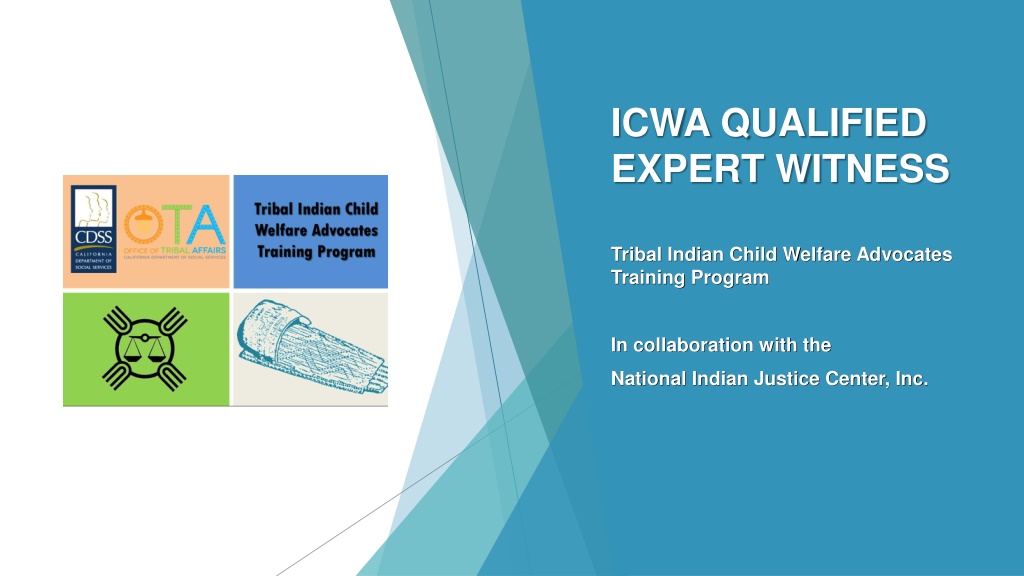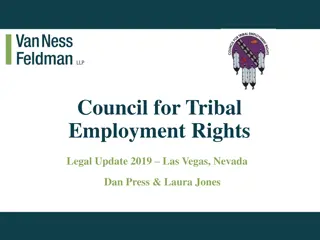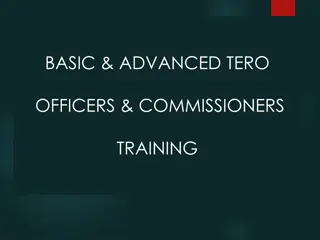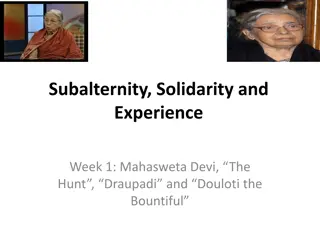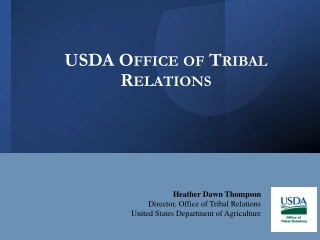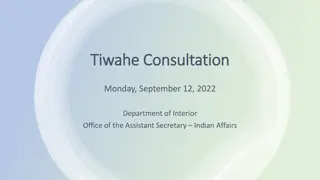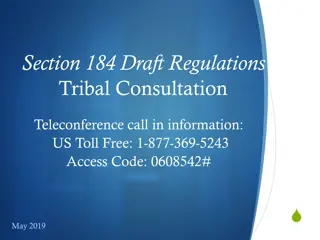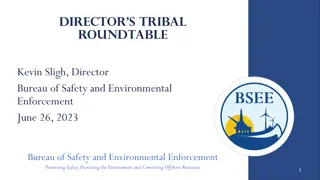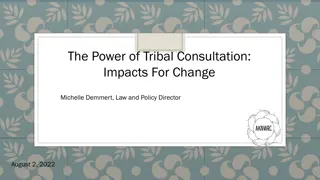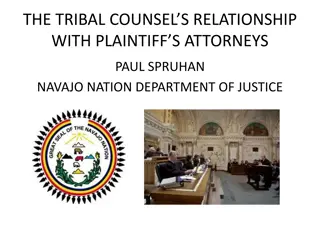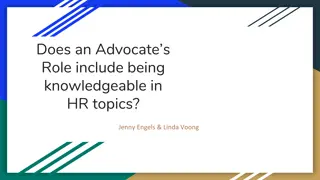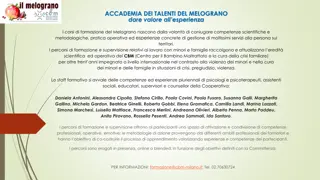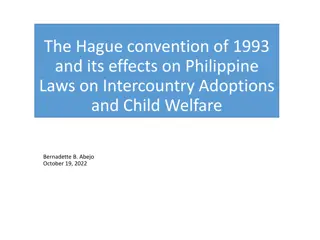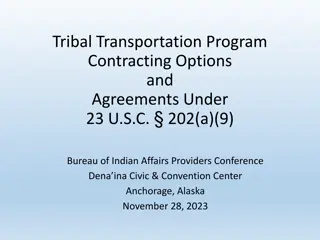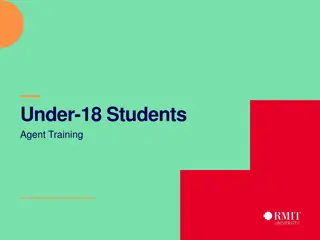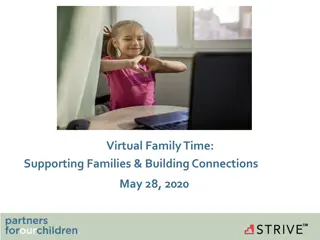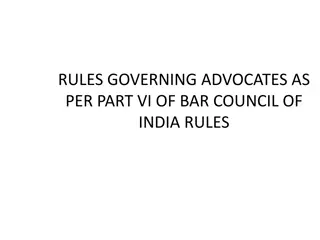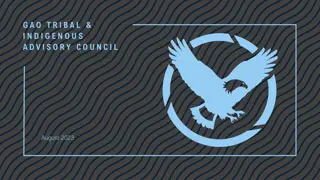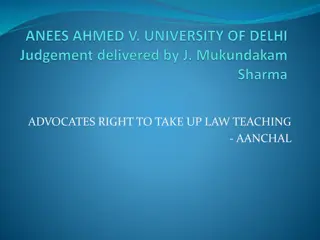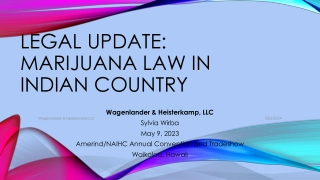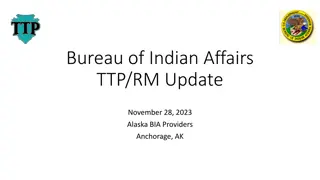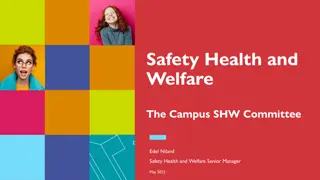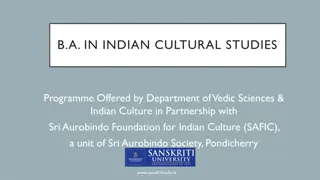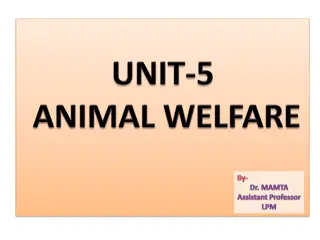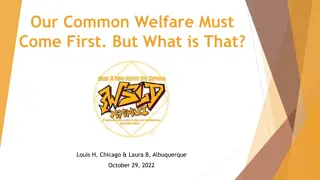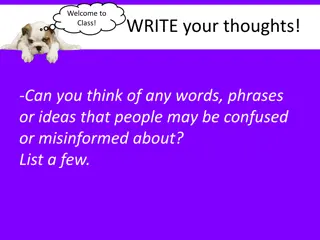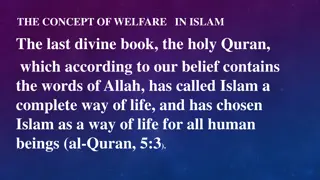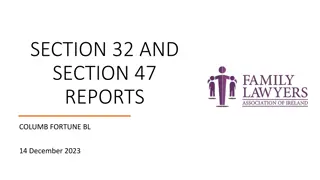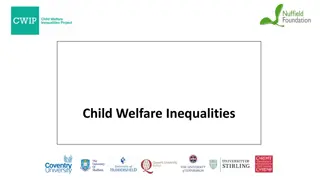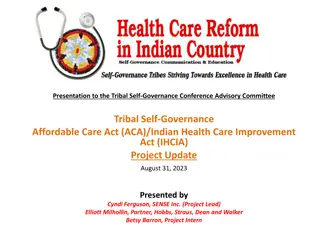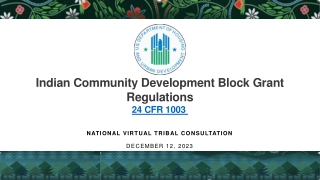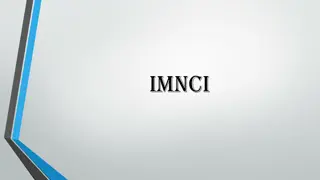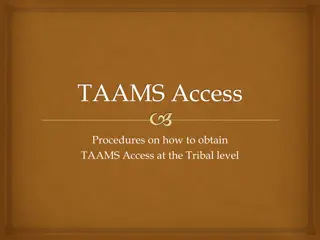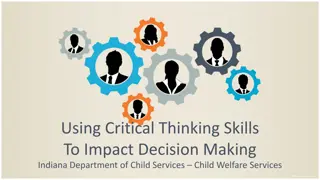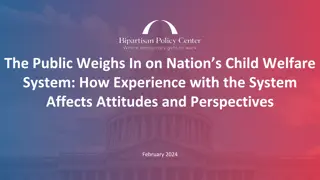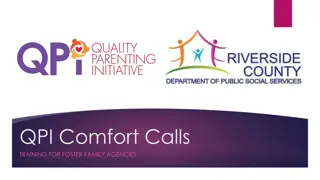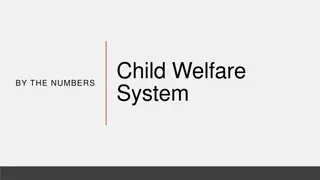Tribal Indian Child Welfare Advocates Training Program
This training program focuses on qualifying expert witnesses in Indian Child Welfare Act (ICWA) cases, covering topics such as the role of expert witnesses, tribal sovereignty, and ethical responsibilities. It aims to enhance the understanding and application of ICWA provisions for tribal social workers and advocates representing tribes in child welfare cases.
Download Presentation

Please find below an Image/Link to download the presentation.
The content on the website is provided AS IS for your information and personal use only. It may not be sold, licensed, or shared on other websites without obtaining consent from the author. Download presentation by click this link. If you encounter any issues during the download, it is possible that the publisher has removed the file from their server.
E N D
Presentation Transcript
ICWA QUALIFIED EXPERT WITNESS Tribal Indian Child Welfare Advocates Training Program In collaboration with the National Indian Justice Center, Inc.
Agenda TOPICS Introductions, Overview of the Training Session, and Learning Objectives Brief Overview of ICWA Provisions and History of ICWA Role of the Qualified Expert Witness & Qualifications When a Qualified Expert is Witness required or needed? Who can qualify as a Qualified Expert Witness? BREAK Causal Relationship Benefits of Tribal or Independent QEW Building Relationships Best Practices QEW Testimony and Active Efforts Challenges for an ICWA Expert Witness Duties of an Expert On-going Training Interactive Activity Guidance on Using Training Materials and Resources Wrap-up, Questions and Answers, Evaluation
3 Purpose of this Training Session This training session is designed for tribal social workers or advocates that represent tribes in Indian Child Welfare Act cases. This training session provides information on who is eligible to be a qualified expert witness, when to use an expert witness, how to identify and select an expert witness for when removal and termination decision making is required in an ICWA case.
4 Learning Objectives Understand the purpose of the Indian Child Welfare Act (ICWA) Understand the concept of Tribal Sovereignty and government to government relationship between Tribes and the U.S. Government Recognize the minimal Federal and California State Standards
5 Learning Objectives Recognize the qualifications of an ICWA QEW, Tribal/Independent Recognize the role of an ICWA QEW, Tribal/Independent Understand the ethical responsibilities of an acting ICWA QEW Identify who serves as an ICWA Qualified Expert Witness (QEW) Understand the benefits for Tribes to provide their own ICWA QEW
6 Learning Objectives Value consultation and collaboration between Tribes and Child Welfare workers Value the importance of researching the Welfare & Institutions Code (WIC) and ICWA provisions Identify and understand the value of Active Efforts Vs Reasonable Efforts
Early U.S. Indian Child Welfare Indian children removed from their parents, family, tribe and community and forcibly placed in boarding schools Congressional Hearings in 1970s-revealed that the removal of AI/AN children from their families had reached epidemic proportions. ICWA passage in 1978 3. Recognition of Tribal Sovereignty: States failed to recognize tribal culture and standards 1. Tribal and Family Connectedness: Indian children vital to continued existence of tribes 2. Preservation of Indian Families: High percentage of Indian families broken up by removal ~Photo Credit: Flickr 7
U.S. Government Boarding Indian Schools With more than 100,000 Native children forced into attending these schools, it became the dominant model of schooling used by the federal government officials to educate the Native peoples of the United States. The first off-reservation boarding school in Carlisle, Pennsylvania, called the Carlisle Indian School, was established by Richard Henry Pratt, a U.S. Army officer. Schools were often run by missionaries By 1890, attendance was enforced through threats of cessation of rations and supplies. By 1926, nearly 83% of Indian school-age children were attending boarding schools. 357 boarding schools in 30 states 1900: 20,000 children in boarding schools 1925: 60,889 children in boarding schools THE BOARDING SCHOOL ERA PRE ICWA Kill the Indian save the man
9 Federal Investigation of the Removal of Indian Children Differences in Culture and Institutional Bias led to a disproportionate removal of AI children from their parents, homes, and communities in the to1950 s, 1960 s & 1970 s than non-Indian children Institutional Bias: to give official sanction to applying a prejudiced outlook to something, i.e., Indian families Most cases (99%) basis for removal were vague standards such as deprivation and neglect rather than abuse
When Does ICWA Apply? ICWA sets federal requirements that apply to state child custody proceedings involving an Indian child. ICWA applies to the following child custody proceedings or situations: an Indian child is involved in an involuntary child custody proceeding; an Indian child may be placed in foster care as a result of removing the child from his or her parent or Indian custodian, and the parent or Indian custodian cannot have the child returned upon demand; the Indian child may be adopted, and parental rights would be terminated; parental rights have been terminated; an Indian child may have a legal guardian appointed by order of the Court; it is recommended that an Indian child be placed in a pre-adoptive or adoptive placement. 10
Federal ICWA provides for optional/additional State Protections SB 678 passed in 2006 in response to continuing lack of compliance with ICWA nearly 30 years later BIA s ICWA final rule (25 CFR 23, 81 Fed. Register 38778) in 2016 clarified and complemented ICWA regulations and guidelines of 1979, 1994, and 2015 California s ICWA SB 3176 passed in 2018 amended 32 sections of the Welfare and Institutions Code (WIC) Implemented ICWA into CA codes WIC, Family & Probate Judicial Council Rules and Forms revised in response to legislation 11
The following lists the minimum Federal standards and California State Standards: Minimum Federal Standards & California State Standards Inquiry & Investigation of Native Ancestry Notice to Tribes Active Efforts Vs. Reasonable Efforts Evidentiary requirements o Qualified Expert Witness Placement Preferences: o Foster Care & Adoption o Tribal Customary Adoptions 12
13 Law Regulations for a Qualified Expert Witness(es) in ICWA Cases ICWA: To learn more about these law regulations and codes, click on the blue hyperlinks below: 25 1912(e) & (f) 25 C.F.R. 23.121 25 CFR 23.122 Federal Guidelines 44 Fed. Reg. 67, 584 (1979)(d)(4) Bureau of Indian Affairs Guidelines for State Courts; Indian Child Custody Proceedings Cal-ICWA WIC 224.6 WIC 361.7 WIC 366.26(B)(ii) California Rules of Court Rule 5.485
Judicial Council Forms Ex: JV-101 (A) Forms JV 100: Juvenile Dependency Petition Social Worker (SW) and assistance Completed By from county counsel Social Worker (SW) ICWA 010A: Indian Child Inquiry Attachment ICWA 030: Notice of Child Custody Proceedings for an Indian Child ICWA 020: Parental Notification of Indian Status ICWA 040: Notice of Designation of Tribal Representative ICWA 050 (New): Notice of Petition and Petition to Transfer Case Involving an Indian Child to Tribal Jurisdiction ICWA 060: Transferring Case to Tribal Court Jurisdiction ICWA 070: Request for Ex Parte Hearing to Return Physical Custody of an Indian Child (new) SW/County ICWA Dept. The Indian child's parent at Court The Tribe (optional) The County Agency (optional) The Tribe Indian child's parent(s) attorney 14 All forms can be found here: https://www.courts.ca.gov/allforms.htm
15 California Legislation Senate Bill 678 Focuses on child custody proceedings for Indian children Goal: the uniform application of the federal Indian Child Welfare Act (ICWA) in California AB- 1325 Allows Indian children and families to realize the permanency and support of adoption without the culturally offensive precursor of TPR by providing "Customary Adoption" as an additional option for permanency planning in ICWA cases AB-3176 Revised the specific steps a social worker, probation officer, or Court is required to take in making an inquiry of a child's possible status as an Indian child, including: Various notice requirements that are mandated during an Indian child custody proceeding, an emergency removal of an Indian child from the custody of his or her parents or Indian custodian; Requires the State Department of Social Services to adopt any regulations necessary to implement these provisions; and Requires the Judicial Council to adopt any forms or rules of Court necessary to implement these provisions
16 THE PURPOSE OF THE EXPERT Why extra testimony is required in ICWA cases
17 Preventing Cultural and Institutional Bias To prevent cultural bias regarding Indian Children in adoptive or foster care today. Since ICWA passed, there has been some improvements but, Indian children are still removed at a disproportionately higher rate. The testimony of a qualified witness testifies that the removal is appropriate and necessary based on the Tribe's child- rearing standards. There are two relevant sections in ICWA where the Qualified Expert Witness plays a significant role in preventing bias in the placement of Indian Children in foster care (25 U.S.C. 1912 (e)) or adoptive (25 U.S.C. 1912 (f)).
18 Role of the Qualified Expert Witness Before the court orders Foster Care, Guardianship or Termination of Parental Rights (TPR), in a case involving an Indian child, a Qualified Expert Witness must testify: "that continued custody by the parent or Indian custodian is likely to result in serious emotional or physical damage" Based on the prevailing social and cultural standards of the Indian Child s Tribe
19 Applicable Standards of Evidence and Causal Relationship Foster Care Placement Burden of proof: Clear and convincing evidence and Testimony of a Qualified Expert Witness
20 Termination of Parental Rights Burden of Proof: Evidence beyond a reasonable doubt and Qualified Expert Witness testimony
21 What does Burden of Proof mean in practice? Burden of Proof means that testimony from a qualified expert witness is required for: The disposition hearing when recommending involuntary foster care placement; and the 366.26 hearing when recommending termination of parental rights. "Best practice" is to require a qualified expert witness and an ICWA detriment finding at such review hearings, particularly when: the ICWA detriment finding was not previously made at disposition because ICWA was not applied; or the ICWA detriment finding was made at the prior disposition hearing but it has become stale due to significant delays in the case or a significant change in circumstances.
22 Securing a QEW Testimony Prior to Disposition Best Practice A Disposition Hearing is to be held within 30 days, when involving an Indian child (CA AB 3176) Once the Court determines the Indian child cannot be returned home, due to continued imminent risk and recommends foster care placement, it is best practice for the agency social worker/county counsel to secure testimony from a QEW as soon as possible, preferably, after the Detention/Initial Hearing. This best practice will ensure the QEW to have enough time to do the following: interview parties to the case, review all documents, write a Declaration and submit it to the Court 10 days prior to the Disposition Hearing, which can prevent the need for a continuance (WIC 352).
23 WHO CAN QUALIFY AS AN EXPERT WITNESS What to look for in a qualified expert witness, and what is the difference between Qualified Expert Witness vs. ICWA Expert Witness?
24 Who is an Expert Witness? An Expert Witness is: Any witness with knowledge, skill, experience, training, or education in a particular field Whose knowledge assists the trier of fact (Judge) in understanding the evidence or determining a fact in issue.
25 Who is a Tribal or Independent ICWA Expert Witness? Someone with knowledge about the culture, customs, values, traditions, and beliefs of their Tribe based on her/his experience, education, skills, and training. The expert witness can be a member of the tribal community with no specialized "education" or degree. As an expert witness, they must be able to determine two things: Tribe's cultural, social, child-rearing standards The risk to the child, if they remain in the home Whose knowledge can help a trier of fact (the Judge) understand the evidence before her/him to determine a fact in issue
26 Cont. Who is a Tribal or Independent ICWA Expert Witness? Persons with the following characteristics, in descending order, are presumed to meet the requirements for a qualified expert witness: BIA 2016 Guidelines A member of the Indian Child's Tribe Recognized by the Tribal community as knowledgeable in Tribal customs as they pertain to family organization and child-rearing practices Recognized to be a qualified expert witness by the Indian Child's Tribe based on their knowledge of the delivery of child and family services to Indians and the Indian Child's Tribe Recognized by the Indian Child's Tribe as having substantial experience in the delivery of child and family services to Indians, and knowledge of prevailing social and cultural standards and child-rearing practices within the Indian Child's Tribe A member of another Tribe A lay person Recognized having substantial education and experience in the area of his or her specialty, who can demonstrate knowledge of the prevailing social and cultural standards and child-rearing practices within the Indian Child's Tribe. A professional person
27 Cont. Who is a Tribal or Independent ICWA Expert Witness? The Welfare and Institutions Code also provides a list of person who "most likely" meet the requirements for a qualified expert for purposes of Indian child custody proceedings: WIC requirements A member of the Indian Child's Tribe Recognized by the Tribal community as knowledgeable in Tribal customs as they pertain to family organization and child-rearing practices Recognized having substantial education and experience in the area of his or her specialty, who can demonstrate knowledge of the prevailing social and cultural standards and child-rearing practices within the Indian Child's Tribe. The expert should NOT be an employee of the social services agency recommending foster care or TPR. Recognized having substantial education and experience in the area of his or her specialty. Any expert witness A professional person
28 How a Social Worker Selects a Qualified Expert Witness? The QEW can be selected by: Ask The Tribal representative if they have a QEW of their choice The Tribal representative if they are agreeable to a selection of an independent QEW, if they have no QEW available Ask Consult with County Counsel as to selecting an independent QEW Review Judicial Council's list of independent QEWs
29 Who cannot be a Qualified Expert Witness in an ICWA case? The Tribe's Social Worker/Representative cannot (not prohibited and not ideal) or the Agency social worker assigned to the ICWA case, cannot provide the Qualified Expert Witness testimony
30 Written Declarations The QEW testimony must be live testimony unless the parties agree to a declaration by: Agreement/Stipulation that testimony can be written in the form of a Declaration The Court must find it was made knowingly, intelligently and voluntarily NOTE: For stipulation and written declaration with substantial time to review the report, workers are permitted to review the report and do not have to sign the expert witness report.
31 Benefits of Tribal QEW The following is a list of benefits of having a tribal or independent Qualified Expert Witness in your ICWA cases: Build community relationships Build relationships with County Counsels Bridge/Liaison between Tribal and County Workers Express & support Tribal Sovereignty Empower & strengthen Tribe's self-reliance Greater involvement in the legal process Tribe has a voice for the record
32 Building Relationships ICWA Dependency cases include Parents, Children, Caregivers, Extended Family members, Tribal Agencies and staff, Social Workers, County Counsel, Services Providers, Attorneys, and QEW's What do they all have in common? Serve Families and Children Offer assistance that is in their best interest to keep the family they are serving in tact.
33 Building Relationships Consultation/Interview Tribe & Department Parties to the Case Collaboration/Establish Rapport Assist Department to be ICWA compliant Positive Outcomes Reunification/Permanency Transfer of Jurisdiction Educate/Network when necessary
34 Best Practices QEW Integrity Follow ICWA requirements Honor & support Sovereign Nations Always consult and collaborate with the Tribe Cultural Competency Tribal QEW Non-Tribal QEW Respect/Empathy Professionalism Agree to Disagree
35 Best Practices QEW Know the unknown Seek to know Be neutral Build a Network Consultants/other ICWA Experts Cultural Resources Avoid cookie cutter opinions Allow the time needed to provide an authentic opinion Avoid making assumptions
36 Active Efforts vs Reasonable Efforts Active Efforts are affirmative, active, thorough, and timely efforts intended primarily to maintain or reunite an Indian child with his or her family. Reasonable Efforts are passive Refer to Handouts: "Active Efforts as of December 2016 "Comparison of ICWA Regulations: California ICWA vs Federal ICWA" (Lavender) pgs. 2-3 "Sample of Recording Active Efforts in a Disposition Court Report" (Green) pgs. 1-3
37 QEW Testimony and Active Efforts Establishing the Tribe's social and cultural practices. QEW Testimony is NOT required by law to prove active efforts, BUT the QEW may be expected to provide an opinion that remedial and rehabilitative programs were designed to prevent the break-up of an Indian family and those efforts were not successful. Qualified Expert Witness may also provide information on the "active efforts" used to address the behavior of the parents or caretaker. The remedial active efforts to address the behavior of the parents or caretaker may be different due to cultural differences. For example: A child's symptoms of illness are being treated by a medicine man, rather than a doctor.
38 Challenges for an ICWA Expert Witness? Application/implementation of ICWA can vary county to county Locating parties of a case to contact Educating child welfare agencies of the areas within ICWA a QEW must consider to formulate an opinion and testify to certain language It may be necessary in our independent investigation/interviews to report ICWA compliance/non-compliance in the Declaration
39 DUTIES OF AN EXPERT WITNESS Compensation, Duty of Potential Expert, and Procedures
40 Compensation The Agency or person (i.e., social worker) bears the burden to recommend a placement or terminate parental rights (TPR) to secure and pay for the expert testimony. If the expert is: A member of the Tribe An employee of the Tribe Compensation should apply for QEW as all other experts the county would use.
41 Agreements Recommend having a QEW provide an agreement that lays out details of: Compensation for preparation Hourly rate or flat fee Compensation for actual testimony Hourly or flat fee Expectation for QEW What is the procedure if QEW finds they do not support the recommendation for removal or TPR? Confidentiality
42 Preparing an Expert Opinion The QEW needs to formulate an opinion after research: Review the case file Request delivery of service logs from the county agency Conduct additional interviews with: Parents Other Family Members Tribal Representative/Social Worker and Agency Social Workers Minor's representative & Minors
43 Prepare a Report (Written Declaration) A written declaration includes: QEW's name and contact information Name of County Case Information Minors' names and case numbers QEW's qualifications of experience Brief history of the Tribe's cultural standards List allegations from Petition Verbatim What research was done to assert an opinion: List all files reviewed; list all parties of the case who were interviewed and include dates and what was reported, including statements made by the Tribal Representative
44 Prepare a Report (Written Declaration) Include Include all Active Efforts/lack of Active Efforts, compliance and/or non-compliance as to ICWA provisions. Write a statement of Causal Relationship that describes existing/non-existing conditions in the home that could/could not cause risk of harm or damage to the Indian child. Write Write Write a statement of opinion in agreement/not in agreement with the recommendation of foster care placement or Termination of Parental Rights. Write Write a brief rationale statement if the opinion is not in agreement with either recommendation.
45 Handling of Legal Documents Confidentiality Gathering Information Refer to Handout: (Orange) "ICWA QEW Review Checklist" Refer to Handout: (Lavender) "Comparison of ICWA Regulations: California ICWA vs. Federal ICWA" - pg. 6 Refer to Handout: (Yellow) "Reporting "Causal Relationship" in a Declaration"
46 Handling of Legal Documents Review all documents for evidence: Investigative Narrative, Custody Warrant, Petition, Amended Petition, if any Court Reports Detention, Jurisdiction, Disposition, Status Review, Addendum, Memorandum of Understanding Case Plan, Court Findings, Case Notes (delivery of services log Child Welfare Services / Case Management System (CMS/CWS) Proper Disposal of Documents Tribal QEW abide by Tribe's practices (file/shred) Non-Tribal QEW shred properly
47 Expectations of the Court Provide Live Testimony Written Declaration Court Appearance by phone/in person Provide written Declaration 5-10 days before Hearing date Speak/Respond only when addressed by the Court ".... your Honor" Address Judge with respect
48 Court Preparation Prepare for cross/direct examination Review reports Review Declaration Court Appearance (In-Person) Arrive 10-15 minutes early or on time to our court hearing Court Appearance By Phone Consult with County social worker/County Counsel and Request for info needed to attend by phone Call to the Court Verify the date, time & Dept. # Verify if the Court will call Or if the QEW needs to call in
49 Testimony in Court The QEW takes the witness stand and testifies in Court under oath. Subject to California law, a Qualified Expert Witness's testimony should be provided by live testimony. However, pursuant to California WIC Section 224.6(e): The court may accept a declaration or affidavit from a qualified expert witness in lieu of testimony only if the parties have so stipulated in writing and the court is satisfied the stipulation is made knowingly, intelligently, and voluntarily.
50 Qualifying the Expert The following section provides an introduction to different types of examinations to qualify the expert. Direct examination Cross-examination Re-direct
